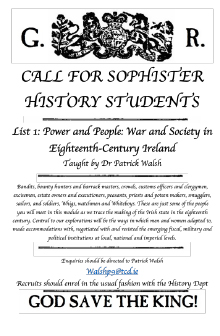HIU34059-60 Power and People: State and Society in Ireland 1689-1783 I and II

- Module Coordinator:
- Dr Patrick Walsh
- Duration:
- All year
- Contact Hours:
- 3 hours per week
- Weighting:
- 20 ECTS
- Assessment:
- Michaelmas term source analysis 40%, essay 60%; Hilary term essay 50%, exam 50%.
These are some of the questions explored in this module, which seeks to investigate the contested processes of Irish state formation in the decades between the Williamite revolution and the American war. Together we will investigate how state power gradually and unevenly traversed the religious, economic and linguistic frontiers of eighteenth-century Ireland. At the heart of this module will be an investigation of the sites and spaces of contestation as well as areas of negotiation, cooperation and collaboration between various interests within Irish society. Drawing on a wide variety of primary sources, including official documents, Irish language poetry, pamphlets, newspapers and visual sources, students will be encouraged to explore how power was exercised by the people as well as by the state looking at riots, popular protest, public celebrations as well as the role of the military, the tax collectors and the law. Frameworks of gender, class and local as well as supra-national identities will be utilised to better understand Irish developments in a comparative context allowing students by the end of the module to assess just how exceptional the Irish experience of state formation really was.

